Related Research Articles

The Indonesian National Revolution, or the Indonesian War of Independence, was an armed conflict and diplomatic struggle between the Republic of Indonesia and the Dutch Empire and an internal social revolution during postwar and postcolonial Indonesia. It took place between Indonesia's declaration of independence in 1945 and the Netherlands' transfer of sovereignty over the Dutch East Indies to the Republic of the United States of Indonesia at the end of 1949.

The Indonesia–Malaysia confrontation or Borneo confrontation was an armed conflict from 1963 to 1966 that stemmed from Indonesia's opposition to the creation of the Federation of Malaysia. After Indonesian president Sukarno was deposed in 1966, the dispute ended peacefully and the nation of Malaysia was formed.
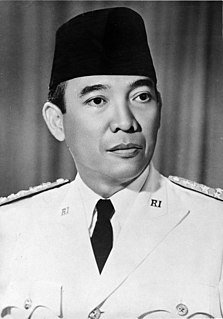
Sukarno was an Indonesian statesman, orator, revolutionary, and nationalist who was the first president of Indonesia, serving from 1945 to 1967.

The Communist Party of Indonesia was a communist party in Indonesia during the mid-20th century. It was the largest non-ruling communist party in the world before its brutal and violent eradication in 1965 and ban the following year. The party had two million members in the 1955 elections, with 16 percent of the national vote and almost 30 percent of the vote in East Java. During most of the period immediately following independence until the eradication of the PKI in 1965, it was a legal party operating openly in the country.
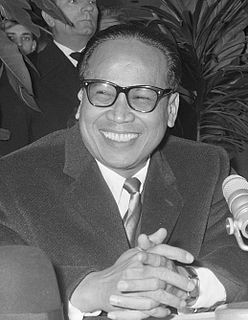
Subandrio was an Indonesian politician and Foreign Minister and First Deputy Prime Minister of Indonesia under President Sukarno. Removed from office following the failed 1965 coup, he spent 29 years in prison.

The New Order is the term coined by the second Indonesian President Suharto to characterise his administration as he came to power in 1966 until his resignation in 1998. Suharto used this term to contrast his presidency with that of his predecessor Sukarno.

Guided Democracy was the political system in place in Indonesia from 1959 until the New Order began in 1966. It was the brainchild of President Sukarno, and was an attempt to bring about political stability. Sukarno believed that the parliamentarian system implemented during the Liberal Democracy period was ineffective due to Indonesia's divisive political situation at that time. Instead, he sought a system based on the traditional village system of discussion and consensus, which occurred under the guidance of village elders. With the declaration of martial law and the introduction of this system, Indonesia returned to the presidential system and Sukarno became the head of government again.
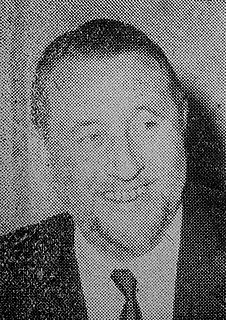
Sir Andrew Graham Gilchrist was a British Special Operations Executive operative who later served as the United Kingdom's Ambassador to Ireland, Indonesia, and Iceland during the Cold War.
This is a list of activities carried out by the U.S. Central Intelligence Agency in Indonesia.

The Madiun Affair, known locally as the Communist Party of Indonesia rebellion of 1948, was an armed conflict between the government of the Self-proclaimed Republic of Indonesia and the left-wing opposition group Front Demokrasi Rakyat during the Indonesian National Revolution. The conflict began on September 18, 1948 in Madiun, East Java, and ended three months later when most FDR leaders and members were detained and executed by TNI forces.
The All-Indonesian Federation of Workers'Organisations was the largest trade union federation in Indonesia. Founded during the period of the country's independence in the late 1940s, the federation grew rapidly in the 1950s. Initially formed with loose connections to the Communist Party of Indonesia (PKI) and with members from other parties, over time the PKI became dominant in the organisation. With the introduction of President Sukaro's guided democracy in the late 1950s, SOBSI was formally recognised and given a place in the national decision-making structures. In the 1960s, SOBSI came into conflict with the Army, whose officers controlled the country's state enterprises. Following the 1965 coup that subsequently produced Suharto's New Order regime, SOBSI was declared illegal, its members killed and imprisoned and most of the leadership executed.

Senja di Jakarta is an Indonesian novel written by Mochtar Lubis and first published in English by Hutchinson & Co. in 1963, with a translation by Claire Holt. It was later published in Indonesian in 1970.

Operation Trikora was an Indonesian military operation which aimed to seize and annex the Dutch overseas territory of Netherlands New Guinea in 1961 and 1962. After negotiations, the Netherlands signed the New York Agreement with Indonesia on 15 August 1962, relinquishing control of Western New Guinea to the United Nations

Indonesia–New Zealand relations are foreign bilateral relations between Indonesia and New Zealand. Having common interests as democracies and neighbours in the Asia Pacific region, New Zealand and Indonesia are viewed as natural partners. Both countries are members of APEC. Indonesia and New Zealand officially established diplomatic relations in 1950. New Zealand has an embassy in Jakarta, and Indonesia has an embassy in Wellington.
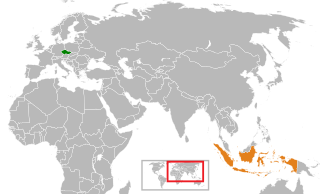
Czech Republic and Indonesia established diplomatic relations in 1950. Both nations has agreed to forge ties to deepen relations, especially in business and trade sector. Indonesia has an embassy in Prague, while Czech Republic has an embassy in Jakarta that also accredited to Brunei, Timor Leste, Singapore and ASEAN, and honorary consulates in Bali, Makassar and Surabaya.
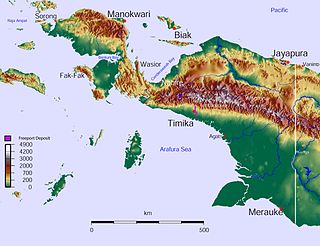
The West New Guinea dispute (1950–1962), also known as the West Irian dispute, was a diplomatic and political conflict between the Netherlands and Indonesia over the territory of Netherlands New Guinea. While the Netherlands had ceded sovereignty to Indonesia on 27 December 1949 following an independence struggle, the Indonesian government had always claimed the Dutch-controlled half of New Guinea on the basis that it had belonged to the Dutch East Indies and that the new Republic of Indonesia was the legitimate successor to the former Dutch colony.
The Conference of the New Emerging Forces (CONEFO) was an effort by President Sukarno of Indonesia to create a new bloc of "emerging countries" that would be an alternative power centre to the United Nations and to the "old established forces"—a category in which Sukarno included both the United States and the Soviet Union. It was intended to build on the legacy of the 1955 Bandung Conference and assert the interests of the Third World and a neutral posture towards the Cold War.
Partindo was a nationalist political party in Indonesia that existed before independence and was revived in 1957 as a leftist party.

Sidik Djojosukarto was an Indonesian journalist and politician of the Indonesian National Party (PNI), who served as the party's fifth chairman from his election in 1950 until his death in 1955. As PNI chairman, he was revered by all party factions, and was the closest to being an "authentic party hero".

Anarchism in Indonesia has its roots in the anti-colonial struggle against the Dutch Empire. It became an organized movement at the behest of Chinese anarchist immigrants, who played a key part in the development of the workers' movement in the country. The anarchist movement was suppressed, first by the Japanese occupation of Indonesia, then by the successive regimes of Sukarno and Suharto, before finally re-emerging in the 1990s.
References
- 1 2 International Labor Directory and Handbook . New York, N.Y.: F. A. Praeger, 1950s. p. 7767
- 1 2 3 4 5 6 Fieldhouse, David Kenneth. Unilever overseas: the anatomy of a multinational 1895-1965 . (Hoover Institution publications, 205). London: Croom Helm [u.a.], 1978. pp. 306-308
- 1 2 3 Redfern, William A. Sukarno's Guided Democracy and the Takeovers of Foreign Companies in Indonesia in the 1960s